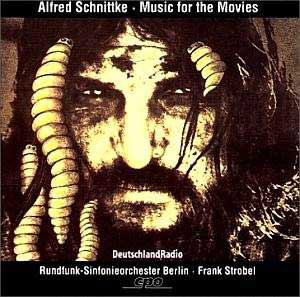It is an astonishing statistic that between the years of 1961 and 1984 Alfred Schnittke produced no less than sixty film scores. They included music for modern films as well as revivalist scores for silent movies and a number of cartoon films. At the same time as producing these scores at the rate of nearly three a year, Schnittke managed to continue to amass a substantial catalogue of work for the concert hall with many of his concert works, not surprisingly perhaps, often incorporating thematic ideas from the particular film score he was working on at the time. Sadly many of these films are not available outside Russia and it is inevitable that a good number of the scores themselves have been lost never to be found. Indeed, it is largely down to the conductor on this disc, Frank Strobel, who enjoyed a close working relationship with the composer, that we are able to hear several of the film scores that have thus come to light.
It has to be said that the music presented on this disc is not always Schnittke at his best, yet his polystylistic language was finely suited to the medium of film and nearly all of the music is highly characteristic and immediately recognisable as his work. Musically, it is My Past and Thoughts and Agony that have the most flesh on their bones, The End of St. Petersburg and The Master and Margarita coming from the early 1990s by which time the composer had already suffered serious ill health, his compositional style having undergone a radical change to a sparser, even severe economy of means. That said, the latest work in particular, The Master and Margarita, does show many a glimpse of his earlier stylistic traits and is notable for a quite startling take on Ravel’s Bolero. In point of fact, references to well known tunes abound throughout these scores, including the Marseillaise and the Russian Imperial Anthem, sometimes firmly tongue in cheek, sometimes transfigured into grotesque musical caricature.
My Past and Thoughts was not positively identified until after Schnittke’s death, the music originally having been assigned to another film altogether. Framed by an eerie representation of St. Petersburg for chorus and orchestra (what is left of the original material is strongly choral), the inner movements range from a tender homage to the Madonna, again with chorus and solo violin which Schnittke proceeds to "distort" in the ensuing movement, to a lively Can Can, very much in the manner of Shostakovich in film mode.
In contrast to the brief extracts that make up the suite from My Past and Thoughts, Agony comprises four more expansive movements, once again framed by related outer movements, in this case a passacaglia which is stirringly dominated by side-drum and brass to begin whilst treated more reflectively to conclude before building to a strident conclusion. The wonderfully macabre waltz and tango that form the central panels (the tango surfaces in several other Schnittke works) are in sharp contrast, yet combine to form what I feel is probably the most musically satisfying of the four suites. This despite the fact that this particular suite was reconstructed with great difficulty after the original was destroyed by the Soviet authorities as a result of its "subversive" subject matter involving Rasputin’s influence over the Tsar.
The brief suite from The End of St. Petersburg, Schnittke’s first score for a silent film, was composed jointly by the composer and his son Andrey who produced parts for live electronics. Overall I find it to be less effective than its predecessors, the changes in Schnittke’s compositional language evident if not as accentuated as in the works for the concert hall. Interestingly The Master and Margarita of three years later is clearly more reminiscent of his earlier style and all the more effective for it. The aforementioned extraordinary treatment of Ravel’s Bolero represents Satan’s ball at which all manner of villains and demons present themselves. Demonic and grotesque it certainly is, not to mention brilliant in its inspiration.
Bringing this music to disc has clearly been a labour of love for Frank Strobel who should to be applauded for his efforts. The Rundfunk-Sinfonieorchester Berlin play with genuine commitment and although, perhaps inevitably, the music is variable in its effectiveness, anyone with an interest in Schnittke’s music should not be without it.
Christopher Thomas


